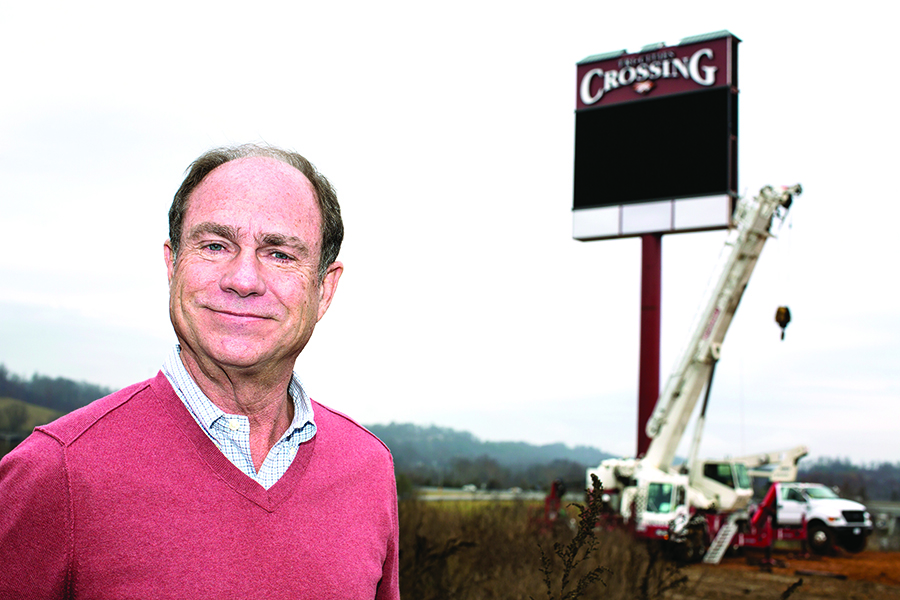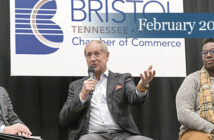The Business Journal Q&A: Stewart Taylor
By Scott Robertson
In all the sound and fury created by the dueling retail developments in Bristol, it’s been easy to forget the development that made them both possible. The original tax incentive plan that was used by Bristol, Tenn., and inspired the plan used by Bristol, Va., was written to help develop what was then called Heritage Point in Kingsport.
Developer Stewart Taylor was ready to announce Bass Pro Shops’ agreement to locate at his site at the intersection of Interstate 81 and Interstate 26, when he got word that Bristol, Tenn., and its developer, Steve Johnson, had offered a better deal. After a flurry of blamestorming in Kingsport, Taylor’s development fell off the radar.
What it didn’t do was die.
On Dec. 4 of this year, crews erected a large sign denoting “Tri-Cities Crossing” on the former Heritage Point site. The Business Journalmet with Taylor at the site and again at his office to discuss his plans to reboot the development. Excerpts from those conversations are printed below.
The Business Journal: We’ve driven by the site and seen the grading work you’ve been doing for months now. But the idea of you being able to come back and develop this site seemed far-fetched. What has happened to make it possible?
Stewart Taylor: Well, we are playing catch up. There’s no doubt about that. The city management of Kingsport put us four years behind because we couldn’t get out from under their micromanagement. But now that they have new leadership, everything is positive. With the current city management in Kingsport, with Jeff Fleming, I’m very optimistic. We’ve signed a letter of intent with the Kingsport Economic Development Board and should have a full contract by January. Then we can get out there and get up to bat.
BJ: Not to belabor a negative, but how could the city management have put you four years behind?
ST: In Bristol they let the developer go do his job. In Kingsport, we were micromanaged by city management. You know, when you go to these big trade shows, you have 500 potential customers to talk to. You need to be able to make them an offer, not just say, ‘I’ll get back to you after I see if the city thinks you’re worth it.’ When you meet these retailers, you have to be able to look them in the eye and tell them what you can do.
The state law is designed to create jobs. The state is willing to give up 4.2 percent of the state’s money. In the past, we would have a problem with the city being unwilling to, for instance, incent restaurants with the full amount of that state funding. My hands were tied because I couldn’t tell a Best Buy, for example, exactly what deal I could offer them. But now, since Kingsport is going to do the type of agreement with me that Bristol did with its developer, I can go out and try to land tenants.
BJ: Before we turned on the recorder, you were mentioning the role Eastman is playing in helping you get this project rolling again.
ST: Well, Eastman has talked before about how they need shopping and restaurants and other quality of life issues addressed so they can get people more interested in coming to Northeast Tennessee. I talked with Cee Gee McCord and Etta Clark at Eastman. They gave me a list of the tenants they would like to see us go after for this development.
They’ve said they would write letters to retailers to let them know things about Eastman like the number of employees and the median incomes, just to let the retailers see the customer base here demographically. I think they also talked with city management as well to help them understand how much they would like to see us succeed.
BJ: As you said, you are playing catch up. Now that you and Kingsport are working better together, what do you feel is a reasonable time frame in which we should expect you to be able to announce agreement with tenants for this site?
ST: I’m putting my own money up for the tenants. It’s not Kingsport’s money, though we need TIF funding. Without that we wouldn’t be able to do the streets and infrastructure. Still, I’ll have to pay that money back if I don’t get the tenants in here. That’s just kind of a loan to me.
Once everything is in place with Kingsport, including the TIF, I expect we’ll have something being constructed within six months. Some of these larger deals will take time. You can’t just wave a wand. But I feel we will have some announcements to make within six months after the TIF agreement is in place.
BJ: Can you tell us anything about the kinds of tenants you think will be most likely to be among the first you’ll announce?
ST: I’ve met with some people myself. I’ve met with hotels, with restaurants. Some of these guys are really ready to go right now. We just haven’t been able to put it in writing because we didn’t have the Kingsport agreement in place. Now that we’ve signed the letter of intent, we need to get the TIF in place. Once that’s all done, we’ll be able to show the results of the offers that I have made to fast food places, convenience stores, and other tenants. With us having a site ready to go, we can start building in 30 days.
The theatre is one of the key things. We don’t have a worthy theatre for a city of 50,000 people in Kingsport, and even Johnson City doesn’t have an IMAX screen. Our communities need this and I want to bring unique new things like this to our region.
BJ: By unique new things, do you also mean stores that don’t have locations in the Tri-Cities yet?
ST: There are a lot of retailers that are looking for just one site to serve the entire region. All cities have a lot of similar retail. I think when new retail is developed, we’ll get our share, and by new retail, yes, in some cases I mean stores that aren’t necessarily in the region yet.






